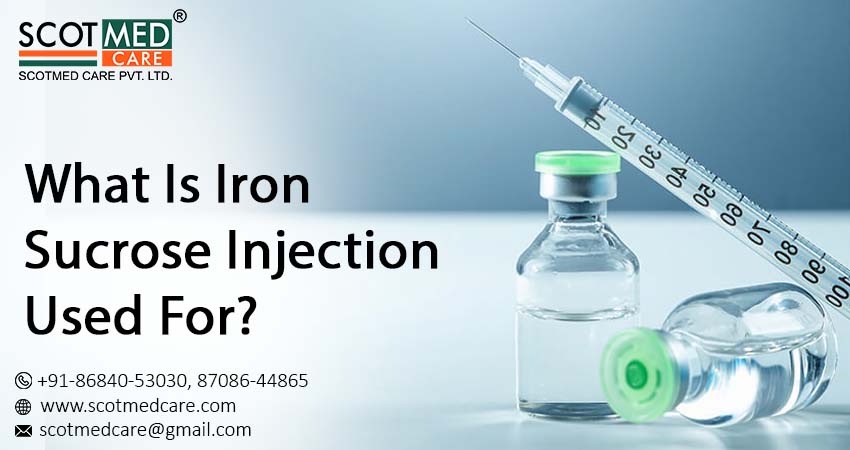Iron Sucrose Injection – Hemoglobin production requires sufficient mineral intake and iron happens to be one of the crucial minerals needed in the body. It also helps in transporting oxygen to various body organs and tissues. If the body does not have sufficient iron, it leads to iron deficiency anemia whereby one experiences fatigue, weakness among other issues. Iron supplements are the most commonly prescribed option to treat iron deficiency. However, they cannot be taken by some patients or in some cases, they are not sufficient. This is the exact scenario where an Iron Sucrose Injection is needed. In this blog, we will explore what Iron Sucrose Injection is, how it works and what conditions it is meant to treat.
What Is Iron Sucrose Injection?
It treats individuals suffering from iron deficiency anemia, as well as those ailing from chronic malabsorption syndrome. Iron is bonded to sucrose in this case, meaning it can be injected directly into the vein without causing any damage. Thus, this type of iron is ideal for patients who cannot seem to absorb oral iron or need iron levels restored quickly. This method of injection enables the body to promptly receive iron infusion and utilise it to generate red blood cells while improving the transport of oxygen. Iron Sucrose Injection is commonly used for patients with chronic kidney disease, those on dialysis or others who are unable to tolerate oral iron supplements.
Uses of Iron Sucrose Injection
1. Treating Iron Deficiency Anemia
It is mainly prescribed to treat iron deficiency anemia. When the body lacks the appropriate amount of iron to form adequate healthy red blood cells, it suffers from iron deficiency anemia. This form of anemia can cause tiredness, pallor and shortness of breath. Iron Sucrose injection directly administers iron through the veins to replace depleted iron stores and restore hemoglobin levels.
2. Supporting Chronic Kidney Disease Patients
Many CKD patients have anemia because their kidneys do not produce sufficient amounts of erythropoietin, the hormone that promotes red blood cell formation. With reduced kidney function, anemia can become increasingly severe. This injection is an effective method to treat iron deficiency in these patients while enhancing the production of red blood cells.
3. Iron Supplementation for Dialysis Patients
For patients on dialysis, there’s notable iron deficiency experienced during and after the process. While they should be given oral iron supplements, they are in no position to take them because of absorption problems. Iron Sucrose Injection eliminates the need for digestive system by directly infusing iron into the bloodstream, thus restoring the patient’s iron levels and enhancing their hemoglobin levels.
4. Pregnancy-Related Iron Deficiency
Women who are expecting a baby tend to be more vulnerable to iron deficiency due to the iron needs of a growing infant. Most pregnant women are instructed to take oral iron supplements; however, they tend to face complications or their condition does not change significantly. In these situations, Iron Sucrose Injection is a rapid and reliable means of restoring their iron levels.
5. Post-Surgery or Blood Loss Recovery
People who have gone through surgeries or have suffered heavy blood loss often require swift ways to raise their iron levels. With this injection, recovery becomes less complicated because their iron stores are replenished directly and normal red blood cell production is restored rapidly.
6. Approaches to Treating Malabsorption Conditions
Specific medical conditions such as Celiac disease, Crohn’s disease or recovery from certain types of gastrointestinal surgeries can significantly hinder absorption of iron from food and oral supplements. Through Iron Sucrose Injection, the digestive system is completely evaded so that the dosage can be absorbed better, therefore treating iron deficiency in these patients.
7. For those with an Intolerance to Oral Iron Supplements
Some patients can face gastrointestinal problems such as nausea, constipation or even severe stomach cramps. If these adverse effects are experienced, Iron Sucrose Injection is ideal because there is no discomfort in digestion when injected intravenously.
How Does Iron Sucrose Injection Work?
After Iron Sucrose is injected into the bloodstream, it is broken down into pieces getting absorbed into the body’s iron reserves. These are usually found in the liver and bone marrow. The iron is then gradually transformed into hemoglobin, the protein in red blood cells that is heavily relied on to transport oxygen. Once this is complete, the capacity of blood to carry oxygen is significantly improved, reducing symptoms like fatigue and weakness due to Anemia.
Advantages of Iron Sucrose Injection Administration
- Rapid Effect: Iron sucrose may be injected into the body through a drip, which makes it useful for patients who need immediate iron supplements.
- Better Utilisation: This injection circumvents the digestive tract, ensuring intravenous delivery of iron. It bypasses oral iron supplements that are poorly absorbed.
- Reduction in Adverse Reactions: These injections are less likely to result in constipation, nausea and stomach upsets and other side symptoms common with most iron supplements.
- Ease of Use by Patients on Dialysis and Suffering with CKD: This is highly beneficial for patients suffering from kidney disease or those on dialysis, as they have poor absorption of iron when taken orally.

Conclusion
If you are looking for Iron Sucrose Injection Suppliers, Scotmed Care is an ISO 9001:2015 certified critical care injectable PCD Pharma Company in India that strives to improve people’s lives, which have been made possible by our consistent supply of high-quality medications.







